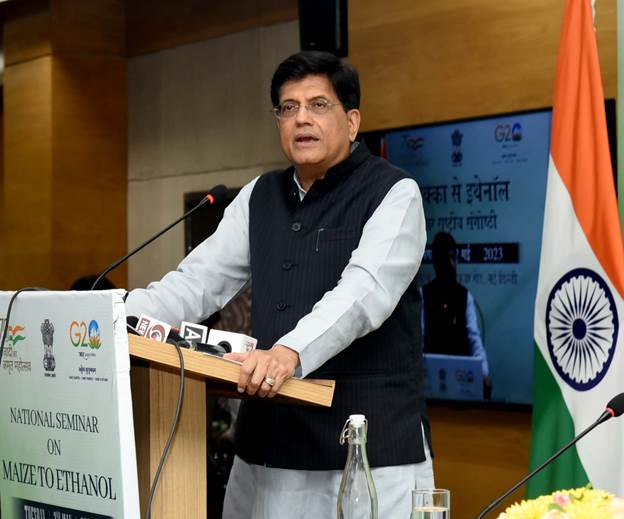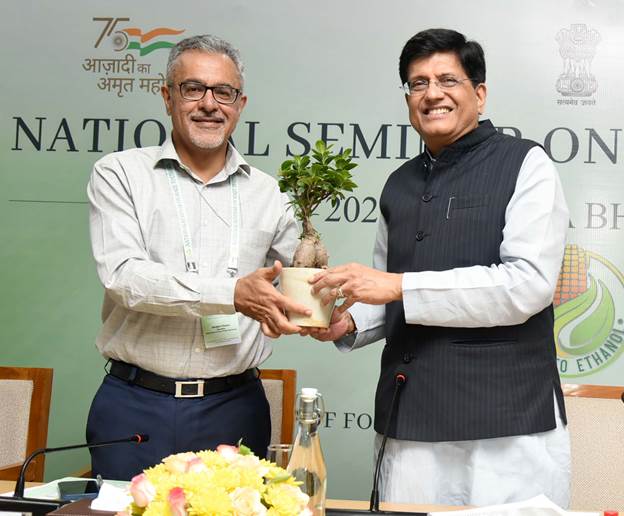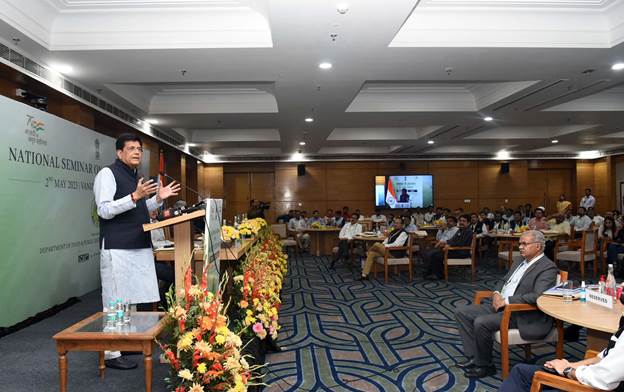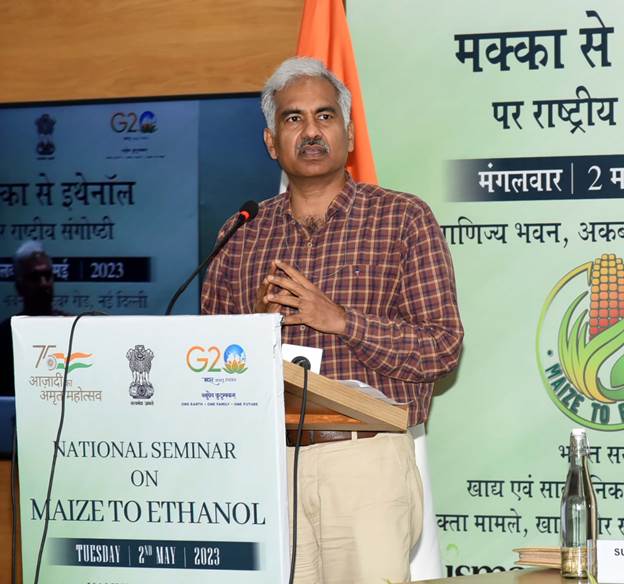
Growth of Ethanol sector is an example for the world: Piyush Goyal
NEW DELHI : The growth of ethanol sector has been tremendous which has set a sort of example for the world, said Shri Piyush Goyal, Union Minister for Consumer Affairs, Food and Public Distribution, Textiles and Commerce and Industry while addressing one day seminar on ‘National Seminar on Maize to Ethanol’ organized by Department of Food and Public Distribution here.

Shri Goyal said that in last 9 years, sugar sector has been self-sufficient with more than 99.9% payment to farmers for previous season. Now, ethanol will support maize farmers in increasing their income and bringing growth with stability on the lines of sugarcane farmers. Investment of thousands of crores have come creating thousands of jobs in rural sector which has generated multiplier effect on Indian economy. He highlighted that environment friendly fuel like ethanol has been on the top priority list of Hon’ble Prime Minister which has resulted in more than doubling of ethanol blending in just 2 years and target of 20% ethanol blending has also been preponed from 2030 to 2025.
Timely planning, industry friendly policies and transparent approach of the Government of India with collaboration of industry has made these achievements a reality, he said. He stressed on the need for synchronous efforts of Central Government, States, Research Institutes, OMCs and Distilleries to achieve the target of 20% ethanol blending while keeping interests of the farmers always on top priority.
The Union Minister highlighted that India has transformed in accomplishing bigger goals in shorter time to be the world leader. Target of E 20 was preponed from 2030 to 2025 so that India can have clean fuel with propagating farmers’ interests.


The Secretary, Agriculture, Shri Manoj Ahuja also expressed the need to have more targeted and region specific approach in promoting cultivation of maize in the country. Secretary, Petroleum supported the idea and highlighted the work of OMCs in collaborating with industry which resulted in achieving 10% blending target last year and moving in right direction to achieve the 20% blending target in time. Secretary, F &PD spelt out the need for assured procurement of maize at MSP and evolving enabling ecosystem for the whole sector as basic necessity to achieve the target for grain-based distilleries.
In India, distilleries generally produce ethanol from molasses which is the by-product of sugar. However, only sugarcane route is not sufficient to achieve the 20% blending target, therefore, ethanol from food-grains such as maize, damaged food grains (DFG) and rice available with FCI has also been allowed. To achieve the target of 20% ethanol blending with petrol by 2025, about 1016 crore liters of ethanol would be required and about 334 crore liters of ethanol would be required for other uses. For this, about 1700 crore liters of ethanol producing capacity would be require considering plant operates at 80% efficiency.
It is estimated that to achieve the target of 20% blending, the requirement of food-grains for ethanol production would be around 165 LMT. Globally, maize is a primary feedstock for production of ethanol as it consumes less water and is economical, however, in India, the use of maize as a feedstock for ethanol production is yet to gain momentum. Currently, grain-based distilleries are producing ethanol from food-grains by using either Damaged Food Grains (DFG) like broken rice or using FCI rice, there is hardly any production of ethanol from maize by grain based distilleries in India. Use of multiple feed-stocks for ethanol production will ensure feedstock security thereby not putting any stress on the availability of any single feedstock. Moreover, maize based ethanol is more economical and water efficient.
The production of maize in the country is consistent. However, due to low demand of maize, farmers are not getting appropriate price for their produce. Production of ethanol from maize will increase the demand of maize and therefore will fetch a better price to farmers. At present, due to export demand, maize prices are high but generally, market price of maize remain below MSP leading to low cultivation area for the crop. Use of maize for ethanol production would assure better prices and consistent demand for maize leading to more cultivation of the crop which is lesser water consuming crop as compared to paddy. Further, distilleries too shall be assured about the availability of feedstock in the market which will not only create win-win situation for both distillers and farmers but also would be of great help in conservation of water and environment.
During all the deliberations, all the stakeholders agreed to have a collaborative approach towards promoting maize production, yield and area. On the lines of sugarcane sector, distilleries need to support maize farmers and assure procurement of their harvest at MSP rate of maize. Petroleum Ministry has also shown willingness to incentivize the ethanol from maize with a medium term stable pricing policy on the matter. Indian Institute of Maize Research will work on better varieties while Distilleries need to collaborate with Cattle & Animal Feed Manufacturers’ Association (CLFMA) on quality standards of DDGS so that distilleries can tap huge opportunities in the sector. With integrated strategy of ethanol, DDGS and other by-products from maize, higher profitability could be ensured for farmers, distilleries and overall industry which would also cater to meet almost 50% need of ethanol for fuel through grain based distilleries.
The seminar thus focused on bringing experts of various varied technological fields under one platform with the aim of looking at ways on usage of technology as a force multiplier to understand the concerns and challenges in promoting maize cultivation as well as to identify a suggestive course of action to progress in achieving the higher maize production in the country which would certainly benefit not only farmers and distilleries but also would be of great help in conservation of water and environment.
Aligning the objective of Atamnirbhar Bharat in meeting fuel energy needs of the country under Ethanol Blended with Petrol (EBP) Programme, with the Central Government’s aim to further interest of maize farmers of the country, the seminar was organized. The objective of the seminar was to bring all stakeholders of Maize and Ethanol industry at one platform and discuss the strategy and priorities for promoting maize as primary grain based feedstock for ethanol production to achieve 20% blending target by 2025. The Seminar was conducted in four sessions each focusing on key aspect of the overall scenario.
Secretary DFPD, Shri Sanjeev Chopra along with Secretary, Ministry of Petroleum & Natural Gas, and Secretary, Shri Pankaj Jain also participated in the Seminar along with eminent experts from various Government Departments, Institutes, Oil Marketing Companies and Industry. Distinguished experts from ethanol industry, sugar sector, Animal Feed Marketing Association and seed/equipment suppliers attended the Seminar.

